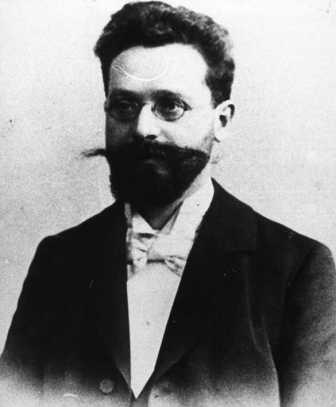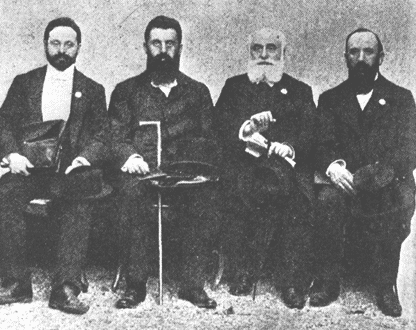 In the last few weeks, a new website of “The Society for the Commemoration of Max and Henrietta Bodenheimer” was uploaded to the internet. The website introduces Max Bodenheimer and his activities. Bodenheimer was one of the leaders of the Zionist Movement in its early days, was the head of several Zionist institutions and one of Theodor Herzl's closest collaborators. His papers are kept at the CZA.
In the last few weeks, a new website of “The Society for the Commemoration of Max and Henrietta Bodenheimer” was uploaded to the internet. The website introduces Max Bodenheimer and his activities. Bodenheimer was one of the leaders of the Zionist Movement in its early days, was the head of several Zionist institutions and one of Theodor Herzl's closest collaborators. His papers are kept at the CZA.
Max Bodenheimer was born in 1865 in Stuttgart to an assimilated Jewish family. Like many other Jewish students in Germany, Max Bodenheimer also came across anti-semitism during his legal studies at university. He wrote his first essay in 1890 in response to the pogroms that took place in Russia: “The Jews of Russia – where to? Syria and the Land of Israel as a refuge for the Jews of Russia”. The anti-semitism in Germany and the Jews' harsh situation in Russia made him reach the conclusion that the Jews should settle in their own country, in the Land of Israel.
After completing his legal training, Bodenheimer settled in Cologne and practiced law. There he met David Wolffsohn and the two became close friends. Bodenheimer and Wolffsohn participated in various Zionist groups and activities in Cologne and also established a Zionist group named “Zion”. After reading an article written by Theodor Herzl, Bodenheimer was deeply impressed by Herzl's personality and his views, and began corresponding with him. During these years in Cologne he married Rosa Dahlberg, and had three children: Fritz Simon, Hannah Henrietta and Ruth.
 The First Zionist Congress was held in 1897; Max Bodenheimar was naturally one of the participants. He was elected to be a member of the Inner Actions Committee. In 1898 he visited Palestine as a member of the delegation which accompanied Herzl to meet the German Emperor, Wilhelm II. The German Emperor had good relations with the Turkish Sultan, and Herzl hoped he would give his support to Jewish settlement in Palestine. The delegation visited Jerusalem, Jaffa and some of the Jewish colonies in Palestine. However, the participants were disappointed when the German Emperor refused their request and referred them to the Sultan himself.
The First Zionist Congress was held in 1897; Max Bodenheimar was naturally one of the participants. He was elected to be a member of the Inner Actions Committee. In 1898 he visited Palestine as a member of the delegation which accompanied Herzl to meet the German Emperor, Wilhelm II. The German Emperor had good relations with the Turkish Sultan, and Herzl hoped he would give his support to Jewish settlement in Palestine. The delegation visited Jerusalem, Jaffa and some of the Jewish colonies in Palestine. However, the participants were disappointed when the German Emperor refused their request and referred them to the Sultan himself.
Max Bodenheimer continued his vigorous Zionist activity. He took part in the Zionist Congresses, helped to write the constitution of the Zionist movement and the Jewish National Fund (JNF), and was the chairman of the Board of Directors of the JNF in Germany. When the First World War broke out, he moved the JNF offices from Cologne to The Hague. He established a committee which aimed to improve the conditions of the Jewish population in areas occupied by the German and Austrian armies.
Like other veterans from the Herzl period, Bodenheimer’s status declined after the First World War, and he was not re-elected as a member of the Board of Directors of the JNF. Bodenheimer became disillusioned with the conciliatory policies of Chaim Weizmann in the wake of the Arab riots in 1929; he decided to join the Revisionist party led by Ze'ev Jabotinsky. Bodenheimer attended the 17th Zionist Congress as a representative of the Revisionist party. During the Congress, a sharp controversy arose between the majority and the Revisionist party concerning the "ultimate goal" of Zionism, and the Revisionists left the Congress. This was the last Zionist Congress in which Bodenheimer participated.
In 1935 Max Bodenheimer immigrated to Palestine and settled in Jerusalem, where he began writing his memoirs. He died in 1940, and did not get to see the establishment of the State of Israel. Hannah Henrietta Bodenheimer, his middle daughter, wrote a biography about her father. She died in 1992, and in her will she designated the family's possessions to the establishment of a society in her father's name. The society's aims are to commemorate Bodenheimer’s contribution to the Zionist Movement and to promote research on various subjects, such as Bodenheimer's Zionist activities, research regarding German Zionism, the contribution of German-speaking Jews to the development of Palestine, and the condition of Jews in Eastern Europe and their emigration to the West and to Palestine. In order to preserve Bodenheimer's memory, the Society for the Commemoration of Max and Henrietta Bodenheimer have established a new website, which includes links to documents and photographs from his personal papers that are kept at the CZA. We hope that the new website will contribute to the spreading of the legacy of this important Zionist figure.